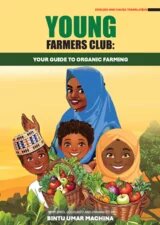Young Farmers Club: Your Guide to Organic Farming
Northern Nigeria is grappling with a deepening agricultural crisis, largely driven by the widespread insecurity and escalating effects of climate change. Erratic rainfall patterns, rising temperatures, frequent droughts and floods, and widespread soil degradation severely undermine food production, rural livelihoods, and ecological sustainability. This crisis is further intensified by unsustainable agricultural practices, such as monoculture agrarian systems, which require the use of toxic chemical fertilizers and pesticides. These not only degrade the soil but also pose serious environmental health risks to farmers, consumers, and the environment.
Despite their critical role in food production, accounting for up to 75 per cent of the nation's agricultural output, smallholder women farmers remain largely marginalized. They face significant barriers in accessing land, resources, and agricultural education. Moreover, rural women and their children and wards, who often assist them on farms, are routinely excluded from efforts to advance sustainable agricultural practices. This exclusion is evident in the lack of culturally relevant and accessible educational materials needed to support a shift away from harmful practices. As a result, health outcomes, crop yields, soil vitality, and household incomes continue to decline.
Crucially, the absence of a broad extension service and inclusive, intergenerational learning opportunities further weakens the region's ability to build a resilient, sustainable agricultural future. Addressing this gap is essential for empowering communities and ensuring long-term adaptation to climate challenges through organic, sustainable farming.
The 'Young Farmers Club: Your Guide to Organic Farming' is a manual written in both English and Hausa languages by hbs' 2024 Nigeria Green Academy Fellow, Bintu Umar Machina. It is aimed at enhancing the capacity of school-aged children to adopt sustainable, climate-resilient farming practices through training and localized agro-ecological education.
